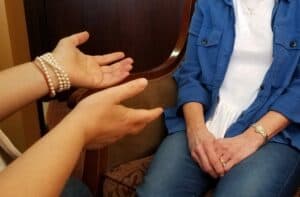If you’ve had depression, anxiety, or even both, chances are you’ve wondered “Can depression and anxiety be cured?” Wouldn’t it be a relief to have the symptoms gone?
The psychological and medical communities believe these common disorders unfortunately can’t be “cured.” However, your symptoms of depression and anxiety can be relieved, though. So instead of “cure,” the goal is remission of symptoms. Remission varies from person to person in real life. Less impaired functioning through reducing or eliminating symptoms is at its heart.
Depression
 Depression is common. According to the Centers for Disease Control and Prevention, 7.6 percent of the U.S. population over the age of 12 are experiencing clinical depression at any one time.
Depression is common. According to the Centers for Disease Control and Prevention, 7.6 percent of the U.S. population over the age of 12 are experiencing clinical depression at any one time.
Fifty percent of those who have one episode of depression will go on to have another one, and a whopping 80 percent of those who have had two depressive episodes will go on to have another one. It’s not well understood why this happens, but genetic, environmental, and emotional factors may play a part.
Because of this tendency for depression to come back, the basis of treatment is a shift to a self-care focus that prioritizes good health habits. That combined with getting ongoing support, psychotherapy, and (often) medication round out treatment.
Anxiety
 Anxiety is the most common mental health issue in the U.S., affecting about 18 percent of the population each year. It can take on many forms: Panic Disorder, Generalized Anxiety Disorder, Social Anxiety Disorder, Phobias, and related disorders like Obsessive-Compulsive Disorder (OCD) and Post Traumatic Stress Disorder (PTSD).
Anxiety is the most common mental health issue in the U.S., affecting about 18 percent of the population each year. It can take on many forms: Panic Disorder, Generalized Anxiety Disorder, Social Anxiety Disorder, Phobias, and related disorders like Obsessive-Compulsive Disorder (OCD) and Post Traumatic Stress Disorder (PTSD).
These disorders respond well to treatment, yet only about 37 percent of people with anxiety seek help. Anxiety often looks or feels like a medical condition (for example, a heart attack). So anxiety accounts for a high number of doctor and emergency room visits across the country. Like depression, treatment for anxiety generally involves lifestyle changes, psychotherapy, support, and medication.
Yes – You Can Have Depression and Anxiety at the Same Time
Is your question “Can depression and anxiety be cured?” coming from a concern that you might have both? Yes, depression and anxiety often occur at the same time. About half of all depression sufferers also have anxiety. But, the two disorders are not the same. You may also wonder “Can Anxiety be caused by depression?” While one disorder does not cause the other, many people who have depression have a history of having anxiety earlier in their lives.
Related Reading: Can Depression and Anxiety be Cured?
What You Need to Know About Treatment for Anxiety and Depression
Treatment for both depression and anxiety usually involves psychotherapy, support, self-care, and possibly medication.
Psychotherapy
 Psychotherapy is an important part of depression and anxiety treatment. Therapy serves a number of purposes: teasing out underlying causes of the depression and working to resolve them, supporting the process of recovery and providing hope, learning new skills and coping methods, and reclaiming control of one’s life.
Psychotherapy is an important part of depression and anxiety treatment. Therapy serves a number of purposes: teasing out underlying causes of the depression and working to resolve them, supporting the process of recovery and providing hope, learning new skills and coping methods, and reclaiming control of one’s life.
Every therapist will have an orientation that guides his or her work. Since the relationship with the therapist is the context in which the treatment happens, it’s important to feel comfortable with that orientation and with the therapist’s personality.
Think about what approach works best with your personality. Are you a body-oriented person? Consider Somatic Experiencing, EMDR, or Yoga Therapy. More of an intellectual? Psychodynamic or cognitive approaches may fit. Carefully reading therapist profiles and asking about their approach to treatment can help you decide if the therapist is a good fit for you.
Support
 Support is a very helpful, though often underutilized, part of treatment. Depression support groups help battle the isolation that often goes with the disorder. Participating in a support group also helps with anxiety treatment because it normalizes the overwhelming physical experience of anxiety.
Support is a very helpful, though often underutilized, part of treatment. Depression support groups help battle the isolation that often goes with the disorder. Participating in a support group also helps with anxiety treatment because it normalizes the overwhelming physical experience of anxiety.
Whether it’s attending a support group like those run online and face-to-face by the Anxiety and Depression Association of America or one run by a local therapy practice, support helps a person know they are not alone and gives hope through seeing the progress of others further along the recovery journey.
Medication
 Medication is often the first line of defense if symptoms are severe. The idea is that medication can lift symptoms enough so that the person has more energy, motivation, and focus to do the work of therapy and take other treatment actions.
Medication is often the first line of defense if symptoms are severe. The idea is that medication can lift symptoms enough so that the person has more energy, motivation, and focus to do the work of therapy and take other treatment actions.
However, in non-severe cases many clinicians prefer trying other treatment methods first to alleviate symptoms. If your symptoms remain entrenched, medication for anxiety and depression can always be added.
If medications are not working or are causing side effects, Medication Therapy Management, also called Pharmacotherapy can help. Pharmacotherapists are pharmacists also trained in psychotherapy. They evaluate the medications and make recommendations to the prescribing physician on additions/subtractions from the medication mix to maximize results and minimize side effects.
Self-Care
 Self-care provides the foundation for the body and nervous system to be in better regulation, which helps lessen depression and anxiety symptoms. What this means is good health habits becoming routine rather than just occasional occurrences:
Self-care provides the foundation for the body and nervous system to be in better regulation, which helps lessen depression and anxiety symptoms. What this means is good health habits becoming routine rather than just occasional occurrences:
• Healthy meals need to become the rule, rather than the exception. Supplements might be helpful, so consult your doctor if they may be helpful for you.
• Regular exercise is vital. In fact, a number of studies have shown that exercise is as effective as anti-depressants for some forms of depression.
• Sleep is known to be restorative, and 7 to 9 hours of sleep nightly is recommended. However, a symptom of depression can be hypersomnia (oversleeping). It’s critical to limit night-time sleeping to 7-9 hours and daytime napping to no more than 90 minutes. Find a buddy who can help you keep accountable.
• Relaxation is an element of self-care that can take many forms. For some, it’s relaxing to be solitary, for example, spending time in nature or reading a book, etc. Others find relaxation in more social ways. For example, taking a walk with someone or meeting someone for coffee. It’s important to make relaxation part of your daily schedule.
Related Reading: Depression and Anxiety Therapy
Final Thoughts
Notably, if you have depression, you will not feel like doing any of these treatment actions. Energy tends to be very low in those with depression.
If you have anxiety, your nervous system arousal will constantly be demanding your attention, making it challenging to take these treatment actions.
However, as I tell my clients, feelings are not facts, and you have to expend energy to grow energy. Begin by choosing the treatment activity that is easiest for you to accomplish – and stick to it. Once that activity is routine, add the next activity that seems easiest to accomplish. Continue to add these treatment activities, one at a time. As you use and practice these treatment actions, depression and anxiety begin to diminish. Generally the more elements of treatment used, the faster symptoms ease.
Still have questions about “Can depression and anxiety be cured?”
My practice in the Chicago area routinely treats depression and anxiety, and offers both body-based therapy and more insight-oriented approaches psychodynamic and cognitive therapies. Contact us in our Glen Ellyn and Chicago (Jefferson Park neighborhood) offices for more information.
Rhonda Kelloway, LCSW, SEP



